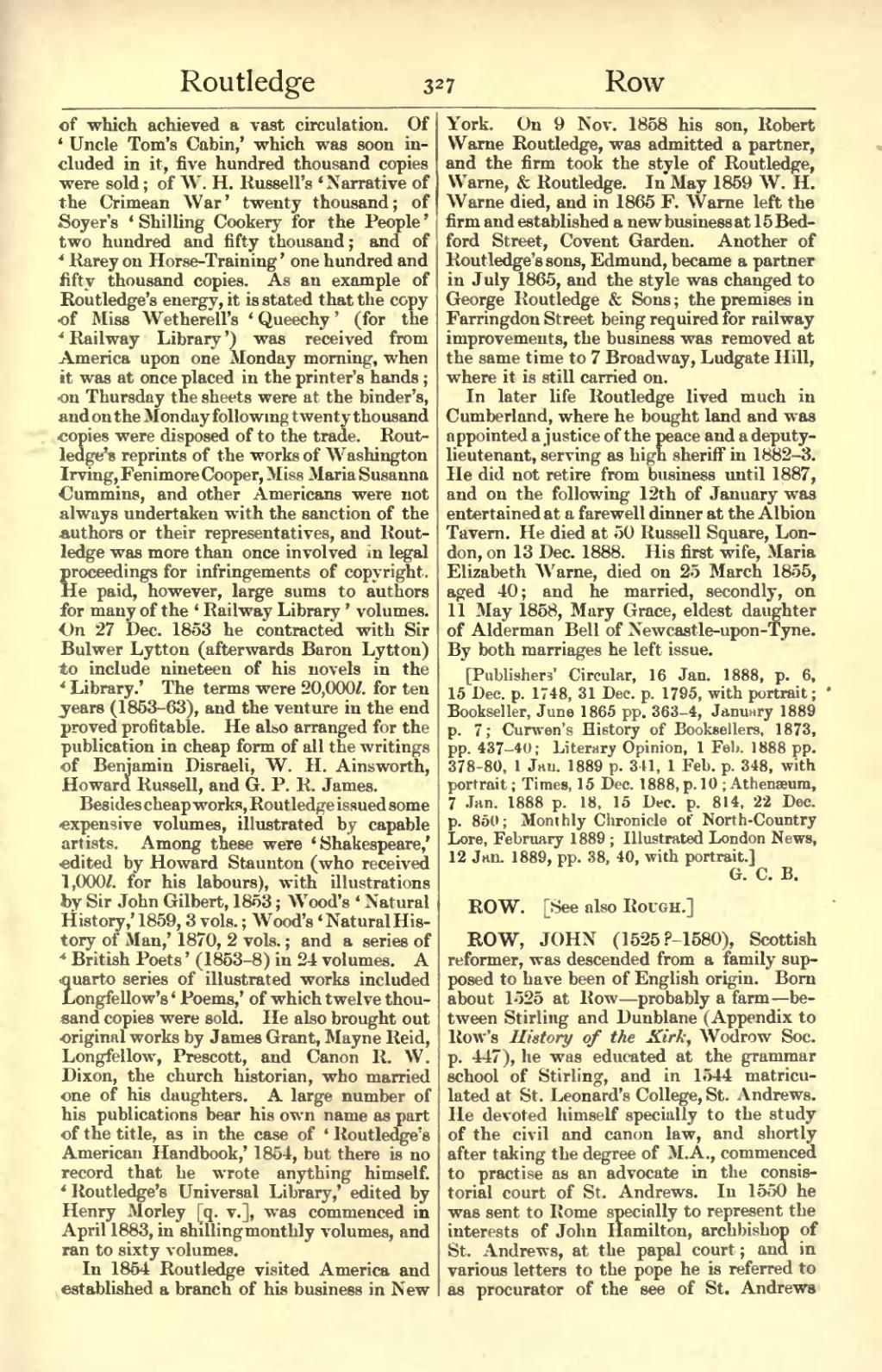of which achieved a vast circulation. Of ‘Uncle Tom's Cabin,’ which was soon included in it, five hundred thousand copies were sold; of W. H. Russell's ‘Narrative of the Crimean War’ twenty thousand; of Soyer's ‘Shilling Cookery for the People’ two hundred and fifty thousand; and of ‘Rarey on Horse-Training’ one hundred and fifty thousand copies. As an example of Routledge's energy, it is stated that the copy of Miss Wetherell's ‘Queechy’ (for the ‘Railway Library’) was received from America upon one Monday morning, when it was at once placed in the printer's hands; on Thursday the sheets were at the binder's, and on the Monday following twenty thousand copies were disposed of to the trade. Routledge's reprints of the works of Washington Irving, Fenimore Cooper, Miss Maria Susanna Cummins, and other Americans were not always undertaken with the sanction of the authors or their representatives, and Routledge was more than once involved in legal proceedings for infringements of copyright. He paid, however, large sums to authors for many of the ‘Railway Library’ volumes. On 27 Dec. 1853 he contracted with Sir Bulwer Lytton (afterwards Baron Lytton) to include nineteen of his novels in the ‘Library.’ The terms were 20,000l. for ten years (1853–63), and the venture in the end proved profitable. He also arranged for the publication in cheap form of all the writings of Benjamin Disraeli, W. H. Ainsworth, Howard Russell, and G. P. R. James.
Besides cheap works, Routledge issued some expensive volumes, illustrated by capable artists. Among these were ‘Shakespeare,’ edited by Howard Staunton (who received 1,000l. for his labours), with illustrations by Sir John Gilbert, 1853; Wood's ‘Natural History,’ 1859, 3 vols.; Wood's ‘Natural History of Man,’ 1870, 2 vols.; and a series of ‘British Poets’ (1853–8) in 24 volumes. A quarto series of illustrated works included Longfellow's ‘Poems,’ of which twelve thousand copies were sold. He also brought out original works by James Grant, Mayne Reid, Longfellow, Prescott, and Canon R. W. Dixon, the church historian, who married one of his daughters. A large number of his publications bear his own name as part of the title, as in the case of ‘Routledge's American Handbook,’ 1854, but there is no record that he wrote anything himself. ‘Routledge's Universal Library,’ edited by Henry Morley [q. v.], was commenced in April 1883, in shilling monthly volumes, and ran to sixty volumes.
In 1854 Routledge visited America and established a branch of his business in New York. On 9 Nov. 1858 his son, Robert Warne Routledge, was admitted a partner, and the firm took the style of Routledge, Warne, & Routledge. In May 1859 W. H. Warne died, and in 1865 F. Warne left the firm and established a new business at 15 Bedford Street, Covent Garden. Another of Routledge's sons, Edmund, became a partner in July 1865, and the style was changed to George Routledge & Sons; the premises in Farringdon Street being required for railway improvements, the business was removed at the same time to 7 Broadway, Ludgate Hill, where it is still carried on.
In later life Routledge lived much in Cumberland, where he bought land and was appointed a justice of the peace and a deputy-lieutenant, serving as high sheriff in 1882–3. He did not retire from business until 1887, and on the following 12th of January was entertained at a farewell dinner at the Albion Tavern. He died at 50 Russell Square, London, on 13 Dec. 1888. His first wife, Maria Elizabeth Warne, died on 25 March 1855, aged 40; and he married, secondly, on 11 May 1858, Mary Grace, eldest daughter of Alderman Bell of Newcastle-upon-Tyne. By both marriages he left issue.
[Publishers' Circular, 16 Jan. 1888, p. 6, 15 Dec. p. 1748, 31 Dec. p. 1795, with portrait; Bookseller, June 1865 pp. 363–4, January 1889 p. 7; Curwen's History of Booksellers, 1873, pp. 437–40; Literary Opinion, 1 Feb. 1888 pp. 378–80, 1 Jan. 1889 p. 341, 1 Feb. p. 348, with portrait; Times, 15 Dec. 1888, p. 10; Athenæum, 7 Jan. 1888 p. 18, 15 Dec. p. 814, 22 Dec. p. 850; Monthly Chronicle of North-Country Lore, February 1889; Illustrated London News, 12 Jan. 1889, pp. 38, 40, with portrait.]
ROW. [See also Rough.]
ROW, JOHN (1525?–1580), Scottish reformer, was descended from a family supposed to have been of English origin. Born about 1525 at Row—probably a farm—between Stirling and Dunblane (Appendix to Row's History of the Kirk, Wodrow Soc. p. 447), he was educated at the grammar school of Stirling, and in 1544 matriculated at St. Leonard's College, St. Andrews. He devoted himself specially to the study of the civil and canon law, and shortly after taking the degree of M.A., commenced to practise as an advocate in the consistorial court of St. Andrews. In 1550 he was sent to Rome specially to represent the interests of John Hamilton, archbishop of St. Andrews, at the papal court; and in various letters to the pope he is referred to as procurator of the see of St. Andrews

